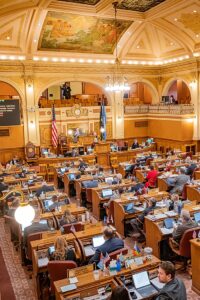South Dakota’s legislature will soon convene to address issues impacting residents statewide. Unfortunately, this body isn’t representative of the state’s population and includes several unusual figures who likely wouldn’t survive a fully competitive election in which all voters could participate.
Open Primaries Rejected
Amendment H, which proposed significant changes to South Dakota’s primary election system, was rejected by voters on November 5, 2024. This is unfortunate, as the state’s political landscape is far from ideal. Many voters weren’t aware of the underlying issues within our political system, which led to caution toward the proposed reform.
Inattentive Voters
Many South Dakotans don’t closely follow state politics. I, too, have been guilty of this for most of my life, not knowing or particularly caring about my state representatives. It didn’t seem to impact daily life as long as the state ran smoothly with its conservative, mostly Republican leadership. But now, South Dakota may face challenging times as our political system appears to be breaking down.

Half of Voters Have a Voice
In South Dakota, half of registered voters identify as Republicans, while the other half are non-Republicans. Yet Republicans dominate politically, holding all statewide offices and 90% of the legislature.
The Republicans’ closed, taxpayer-funded primary often serves as the de facto election. Winning the primary often means uncontested ascension to office, sidelining the half of the state’s voters excluded from this process. Voter turnout in these primaries is typically low, leaving more than 300,000 non-Republican voters, most of whom are independents, without a significant role in selecting those who govern.
The Democratic Party exists in name only, holding an “open” primary with minimal participation. In 2024 there was only one contested Democrat legislative primary race in the state.
Politicians Reluctant to Challenge the Status Quo
Self-interested party bosses opposed open primaries, and elected officials largely stayed silent. Privately, many acknowledged the problems and supported the reform but refrained from public endorsement, paralyzed by fear of party repercussions.

Under the closed primary system, politicians must appease party leaders, often following directives to avoid being “primaried” by party loyalists in the next cycle. New or competitive ideas are unwelcome if they disrupt the status quo, with party interests frequently taking precedence over democratic values like fairness and transparency.
One exception was state Senator Michael Rohl, who courageously supported open primaries. He stated that the public vote would decide whether he was accountable to his constituents or party bosses. He now has his answer.
Other than Rohl, only former elected officials supported open primaries, including outgoing Senator Schoenbeck and former U.S. Senators Daschle, Johnson, and Pressler, as well as Democrats Billie Sutton and Bernie Hunhoff.
Lack of Competition Leads to an “Odd Duck” Legislature

Due to the stronghold of Republican leaders over our state’s election system, there is limited competition in our elections. Many “elected officials” secure their positions without facing competitive primaries or general elections—21 of the 35 state senate seats were effectively filled before the general election in both 2022 and 2024.
As a result, our heavily Republican legislature is more conservative than the average South Dakotan, with values and priorities that may not align with those of their constituents. This “odd duck legislature” includes individuals who likely wouldn’t survive an election with a broad voter base and competent challengers.
Our incoming legislature may face even greater challenges as the Republican Party contends with an internal split between traditional conservatives and a newly energized activist faction. This year’s low-turnout primary saw over a dozen incumbents replaced, resulting in new legislative leadership. Perhaps former leaders now regret not supporting open primaries.
Impotent Legislature
Our Republican-controlled legislature often struggles to address major public policy issues effectively, including expanding Medicaid benefits, establishing practical abortion limits, election reform and eliminating the sales tax on groceries. Frustrated citizens are forced to turn to the initiative and referendum process to push for change directly.
Missed Opportunity
By rejecting Amendment H, South Dakota voters missed a chance to address some of the fundamental issues plaguing state politics. It’s unclear when, or if, such an opportunity will arise again. For now, we can only hope our undemocratic system doesn’t lead to serious consequences for the state.
Maybe instead of squandering so much money on ballot measures we should help organize the opposition party? Under Republican supermajority rule we’ve banned abortion, have average teacher pay near or at the bottom of both the region and the country, we incarcerate at almost twice the rate of ND, provide almost no state general funds for childcare. Our biggest export continues to be educated young people. Why don’t we start by ensuring we have primaries in every legislative election for both parties here in Sioux Falls?
Good friend Reynold … I fear the Democratic Party brand in SD is damaged beyond repair. To dump money into this coffee-and-cookies clatch would not be fruitful. A lotta talk. Little action. Except to fight a measure that would have moved the primary ballot from 1 to 105 opportunities for Democrats to affect change? Can’t say as I understand. Fighting H reflected about concern for party over state. Which is the root of the problem in SD in a nutshell.
The party would need to start at the very top: with a re-write of the party constitution and it’s hilarious, 20+-page platform.
We’re overdue for Pho Quyen. With extra Sriracha. 🙂
Amendment H would have allowed voters to elect candidates who represented the majority of South Dakotans. I am extremely disappointed that voters did not understand that incredibly simple concept.
Don’t assume SD voters didn’t understand.
Like it or not, they have spoken.
Get over it.
As independents, we were very disappointed that Amendment H did receive the votes needed to pass. It seemed like the anthem was “If you like the way things are, vote against amendment H”. The point that is missed is that the way things are and who gets to make those decisions may not be representative of what ALL voters want. And, if the way things are is so terrific, it should be put to the scrutiny and voice of all eligible voters and not controlled by rules that prevent it. This seemed like a simple and easy Amendment to understand and pass.
After the Harris defeat, many commentators on the left started their crying episodes blaming voters. Well, the Harris problem wasn’t the voter, it was the candidate.
And so it was on H. Even though I was a supporter, the margin of loss makes it obvious that that duck has left the pond. We’ll just need to live with the status quo until a more urgent case is made to more voters.